When I was young I visited a place where bamboo trees lined the roadways and riverbanks of the countryside. People in that village used the tree stalks (canes) to weave baskets and mats. Industries also use this plant to make a host of things from paper and floorings to even beer.
But I did not know that you can make bamboo leaf tea, until a few years ago. Bamboo shoots are also a delicacy in Asian countries including Thailand, Korea, Taiwan, Japan, and Northeast India.
Continue reading and learn more about bamboo leaf tea benefits and why it may be your next herbal tea craze!
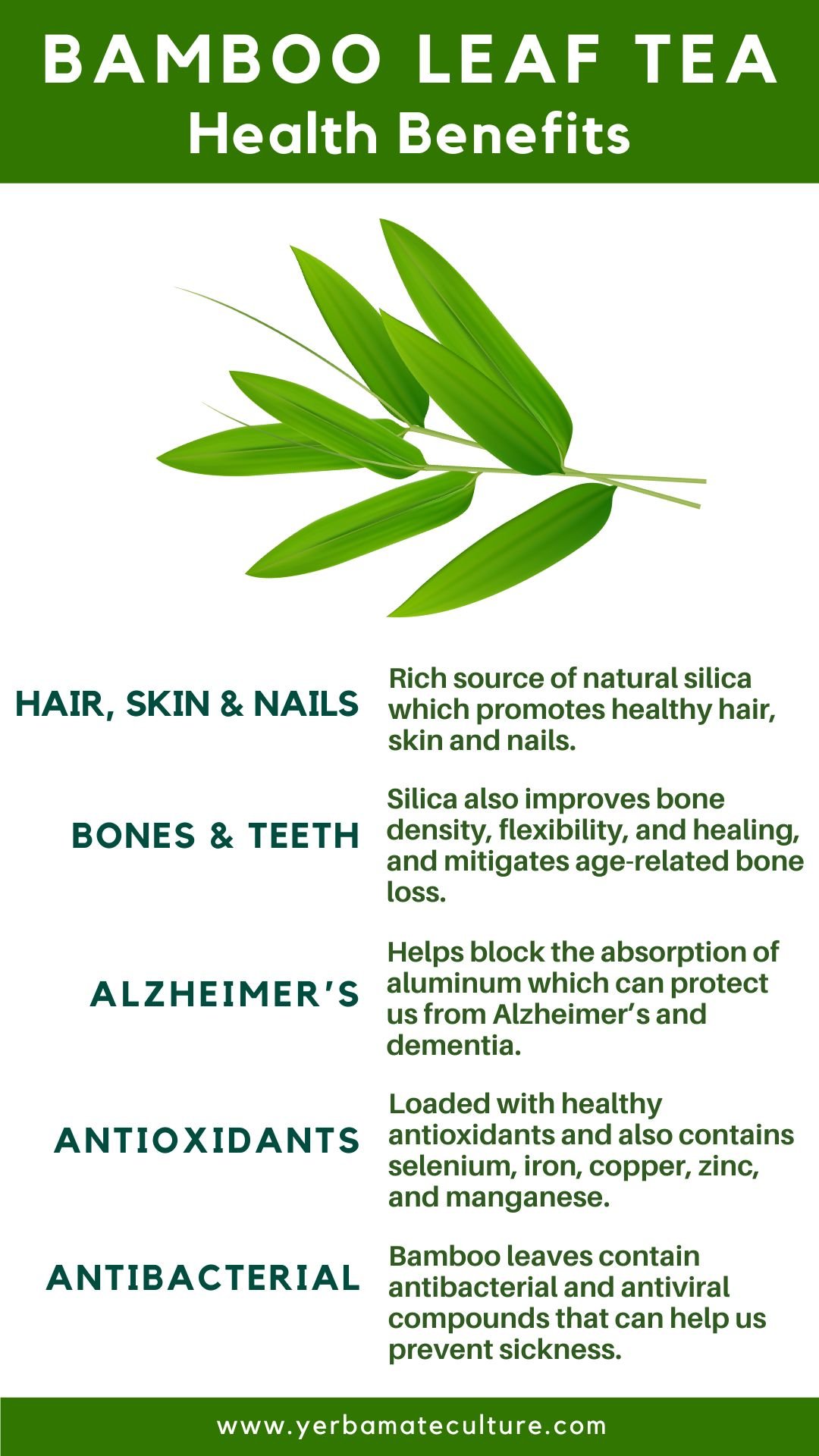
About Bamboo Plant
Bamboo has been used in Asian cultures for many purposes for centuries.
Bamboo, (subfamily Bambusoideae) is part of the grass family. It’s a member of the tall treelike grasses of the family Poaceae.
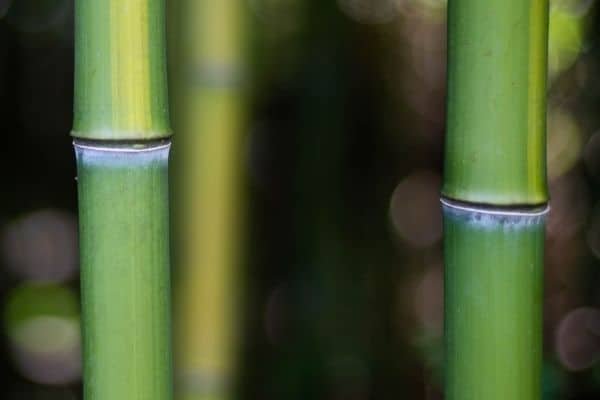
The plant grows in tropical and mildly temperate regions. Many of the species are found in East and Southeast Asia. The jointed stems, or ‘culms’, can range in height from a few centimeters to 40 meters.
Bamboo grows very quickly, with some species growing as much as 30 cm (1 foot) per day!
Bamboo Tea
Traditional Chinese medicine uses bamboo for its health benefits and one way is by brewing tea from the leaves. The tea is made from the young leaves of the plant.
Bamboo tea has a light, sweet yet grassy flavor and makes a perfect green tea-like beverage, but without caffeine.
Surprisingly, all the parts of the bamboo plant (seeds, leaves, rhizome, culm shaving, roots, and shoots) have some sort of medicinal benefits. For example, the leaf has antioxidant, antibiotic, and anticancer properties.
Bamboo Active Compounds
The main active compound found in bamboo is a mineral known as silicon dioxide or silica. This naturally occurring mineral is found plentiful in the Earth’s crust.
Trace amounts are found in the human bone and connective tissue and it helps to protect these structures.
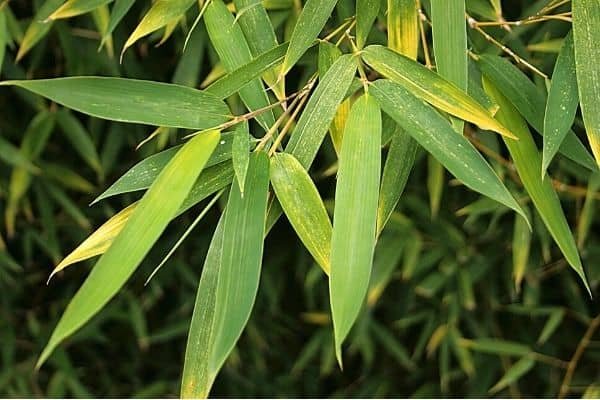
It so happens that bamboo is one of the few plants alongside horsetail herb and stinging nettle that are rich in silica. However, bamboo has 10 times more silica compared to stinging nettle or horsetail herb.
This multipurpose plant is also a rich source of other nutrients and bioactive compounds such as antioxidants and minerals.
5 Amazing Bamboo Tea Benefits
Let’s take a look at how bamboo can enhance your physical appearance and protect your bones, brain, and body.
1. Promotes Healthy Hair, Skin, and Nails
The insatiable desire for long luscious hair, smooth skin, and strong, healthy nails is the reason why certain beauty products fly off the shelves. You may understand why considering that many people associate these traits with beauty.

At the moment, beauty products containing silica are trending and in high demand. The question is why?
Scientific studies suggest that silicon supplements can help promote healthy hair and nails. And as mentioned earlier, bamboo leaves are one of the best natural sources of this mineral.
Silicon can also improve skin elasticity and strength because of its ability to promote the formation of collagen – a protein naturally produced by the body.
Unfortunately, collagen production declines as you age. When collagen levels drop, the skin becomes lax and more prone to fine lines and wrinkles.
In addition, silica promotes hair regrowth and increases the shininess of your hair. These findings led to more research on the benefits, safety, and efficacy of dietary supplements containing silicon.
2. Helps Strengthen Bones and Teeth
Silica also boasts bone-building and bone-strengthening properties. It can improve bone density, flexibility, and healing, and may mitigate age-related bone loss.
The bone protecting profile of silica also extends to the jawbone. A healthy jawbone means healthier teeth and fewer chances of tooth loss.
One study reviewed the role silicon can play in treating and preventing osteoporosis in women following menopause. Osteoporosis called “brittle bone disease” occurs when the body makes too little bone or is unable to replenish bone quickly enough. The bones become weak and may easily break as a result.
Hormonal changes are the cause of bone loss and low bone density in postmenopausal women. The study found that increasing silicon intake may increase bone density (make it stronger) and prevent breakage. However, the silicon intake by these women is more effective for women receiving hormonal replacement therapy (HRT).
3. Prevents Alzheimer’s
Alzheimer’s is a progressive brain disease that leads to memory loss and trouble thinking or making decisions. The disease is common in seniors past the age of 60.
Currently, there is no cure for Alzheimer’s, but there are treatments to help slow its progression. As you may already know, the many side effects of drug treatment push people to look for natural or herbal remedies.
Bamboo herbal tea may just be something that can help people at risk of Alzheimer’s. According to studies, regularly consuming bamboo products may lower the risk of Alzheimer’s disease and Parkinson’s disease which is a type of dementia.
A particular study looked at the daily intake of aluminum and silica from drinking water as a risk factor for Alzheimer’s disease. Based on the findings, aluminum may contribute to cognitive decline as seen in patients with Alzheimer’s and dementia.
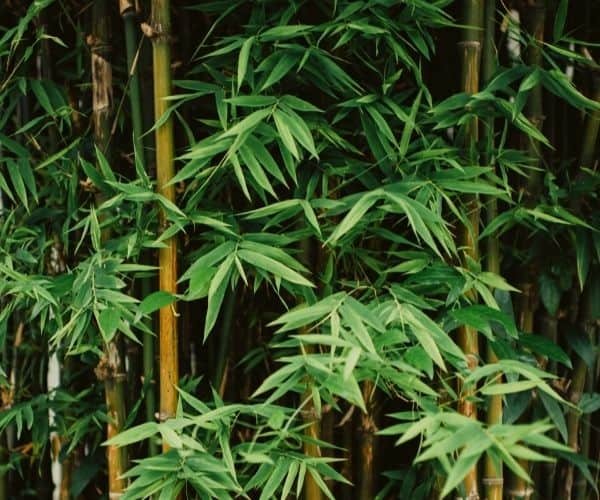
Interestingly, the silica present seems to block the absorption of aluminum in the digestive system. Therefore, the protective effect of high silica intake may help prevent these degenerative brain disorders.
4. Rich in Antioxidants and Minerals
Bamboo is said to be good for your hair, nails, bones, and teeth. It is loaded with antioxidants and other substances that can slow the process of aging and protect your body from viruses and diseases.
The dominant antioxidants in bamboo leaves are phenols, flavonoids, and vitamins C, and E. They play a part in scavenging free radicals in the body that are known to cause cell damage.
Meanwhile, bamboo shoots are also packed with selenium, iron, copper, zinc, and manganese. Because of its vast bioactive potentials, researchers are now eyeing bamboo as an alternative way to produce the natural antioxidants the food and pharmaceutical industries need to preserve their products. Bamboo can be a natural and reliable source considering how fast it grows.
5. Has Antiviral and Antibacterial Properties
In vitro studies were done to test the antiviral properties of bamboo leaf extract solution bamboo (BLES) and sodium copper chlorophyllin solution(SCCS). The investigation focused on influenza and HIV which are caused by viruses.
The results showed that bamboo leaf has antiviral activities against the influenza virus and HIV by blocking viral attachment in the body.
Researchers also believe that bamboo leaves may be good for oral health and the prevention of periodontal disease because of their antibacterial effect on the mouth.
Possible Side Effects of Bamboo Tea
The discovery of bamboo tea benefits and bamboo’s overall positive effects on the body is exciting for many.
However, before I had my first cup of bamboo tea, I also decided to research the side effects. I usually do this with any new herbal product I plan on taking.
There is no scientifically proven information online about the potential side effects of bamboo leaves or shoots and they are generally considered safe for human consumption.
As a precaution, individuals with an allergy to grass pollen should be careful when consuming bamboo products due to the risk of an allergic reaction.
Stop using the product immediately and tell your doctor if you experience the following signs of allergy that are more likely to occur from bamboo shoots:
- Rash
- Itching
- Swelling
- Runny nose
- Itchy or watery eyes
How to Make Bamboo Leaf Tea
I’m delighted to tell you that preparing some healthy bamboo leaf tea at home is easy. You can brew your tea with either fresh or dried leaves.
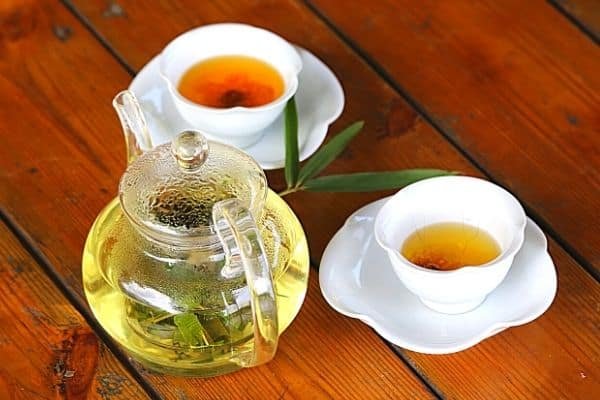
From Fresh Leaves
First, you’ll need some freshly plucked and washed young bamboo leaves. You can also order some vacuum-packed bamboo leaves from Amazon.
Here is how to make tasty bamboo tea from fresh leaves:
- Cut the leaves into small pieces with scissors.
- Fry the leaves in a pan or toast them in the oven until they start turning a bit brown.
- Add some water and the leaves in a saucepan and bring to a low boil. Let it steep for a few minutes.
- Transfer into a teapot and let sit for a few more minutes.
- Pour into cups and enjoy the subtle grassy, naturally sweet flavored tea or sweeten with natural raw honey!
The amount of bamboo leaves depends on how strong you like your tea. Start with a couple of small leaves per cup of tea.
From Tea Bags or Loose Leaf Tea
The easiest option to make a cup of healthy bamboo tea is to order some tea bags or loose leaf bamboo tea from Amazon.
Here are my recommendations:
- Best Bamboo Tea Bags: Beautifully Bamboo Tea Bags
- Best Loose Leaf Bamboo Tea: Beautifully Bamboo Loose Leaf Bamboo Tea
Follow the directions on the product package for the best result. You can use one of our recommended induction kettles or electric tea kettles to make things faster and more convenient.
Feel free to add fresh lemon juice, mint, or freshly grated ginger. This ought to provide an herbal fusion with a twist and even more health benefits.
Remember that you may need to drink a cup of freshly brewed tea 1-3 times daily to notice a difference in your hair, nails, and skin.
Experience the Benefits of Bamboo Tea!
I hope this article provided you with all the information you were looking for.
If you have any questions or comments related to bamboo leaf tea and the health benefits that it can provide, please post a comment below.
Enjoy your tea and stay healthy!
-Joonas

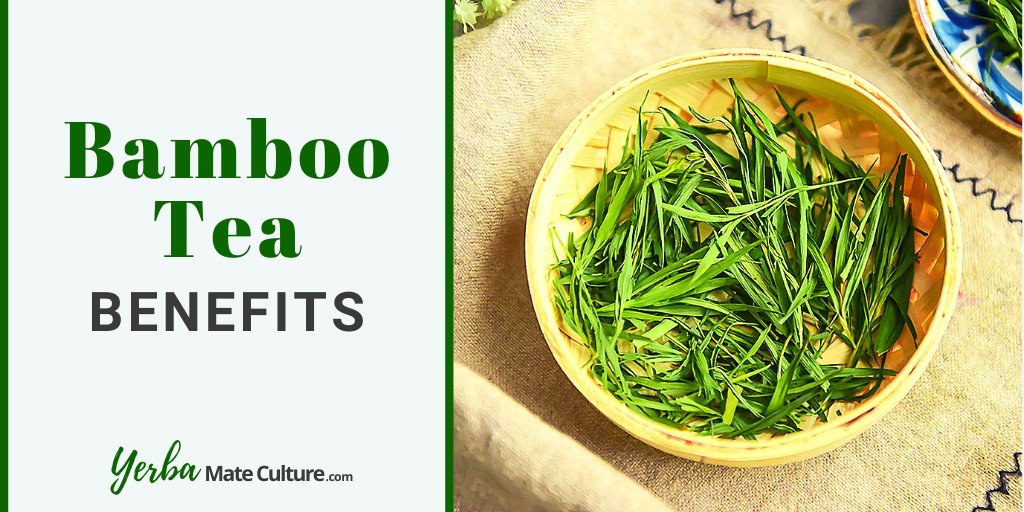
Dear Author,
Thank you for this information, it’s really helpful. I live in Suriname, South America, and we have a lot of bamboo trees in our country, but we did not know about the benefits that bamboo leaf has. Now I can share this with my friends and family. I try to drink every day 1 cup of bamboo leaf tea in the evening.
Yours sincerely,
Munusami V.
Hi Munusami,
Great to hear that you found my article useful. Enjoy your bamboo tea!
-Joonas
Thanks for such good information on bamboo tea Joonas! I really appreciate the details on how to prepare and the suggestions on which brand to buy. I was actually thinking of getting the brand you suggested but was still on the fence, I’m sold now. I sure do hope it helps me with hair and nail growth:)
Hi Kay,
Nice to hear that you found my article useful. I hope you will enjoy the bamboo tea!
-Joonas
Thanks for your information. Will take bamboo tea for osteoporosis. Hopefully this will increase my bone density naturally 🤞
Glad to hear that you found my article helpful! I hope that bamboo tea will help you with osteoporosis.
-Joonas